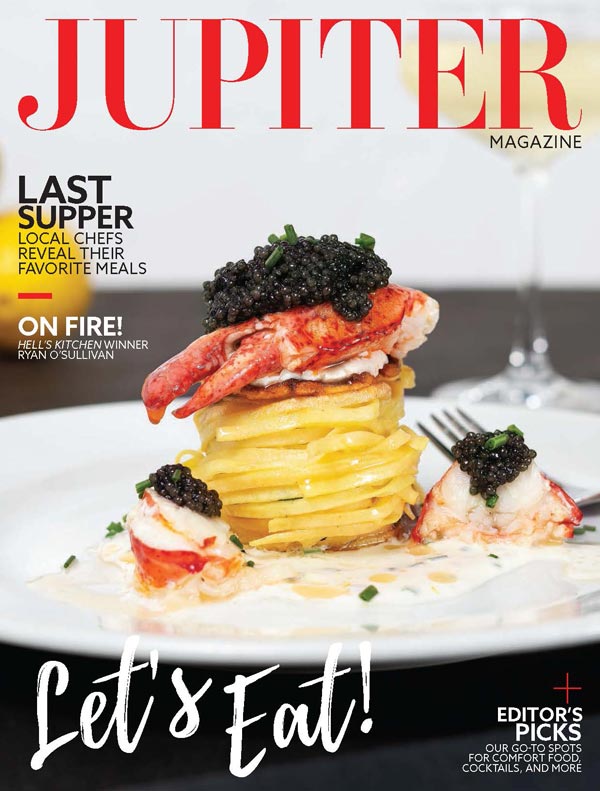
Mia Brister has a heart for helping people. When the Jupiter resident was diagnosed with stage four Hodgkin’s lymphoma at age 24 in 2018, her drive to give back to her community only intensified. After striking up conversations during chemotherapy with other cancer warriors about the headscarves Brister was sewing at home by hand, an idea came to her. Through her nonprofit, Warrior Expressions Foundation, Brister and her team purchase and send bespoke headscarves to cancer patients across the country, all free of charge.
To help offer connection, compassion, and community for cancer warriors near and far, the foundation hosts monthly connection groups (the next one is on November 4 via Zoom) for open, honest conversations about cancer. Warrior Expressions Foundation’s first annual Butterfly Effect Celebration fundraiser is taking place on Sunday, November 7, on the Harbourside Place Rooftop.
We caught up with Brister ahead of the event to learn about her journey from cancer warrior to Warrior Expressions founder:
Jupiter Magazine: What was it like to receive a cancer diagnosis as a young person?
MB: It was very isolating, especially being so young. It felt like life got ripped away from me and I didn’t have anyone my age that I could relate to. Walking into the chemo room for treatment, I would get looks from everyone because they were shocked to see someone my age.
Did it ever become a less isolating environment for you?
Things shifted around my second or third chemo treatment (out of 12). I’m very social and I’ve always had older friends, so I talked to whoever I was next to—many of whom are now great friends that I keep in contact with. Social media also helped me connect with people outside of my community. One of the people I met via social media was Sydney Cintron, who is now the foundation’s Director of Treasury. I remember reaching out to her when she posted about her breast cancer diagnosis at age 25, and I thought “Oh my gosh, she’s so young.” Now we work together to help other women through their cancer journeys.
It’s kind of a bittersweet experience, but it’s incredible that we’ve been able to connect and help other people.
What inspired you to start Warrior Expressions Foundation?
My mom is from Costa Rica, so I grew up immersed in Latin culture. Long hair is part of my culture and my three sisters and I spent time fixing ourselves up. Hair was just always important to me, but I never realized just how important until I was diagnosed and I turned to my doctor and asked, “Am I going to get the chemo treatment that will make me lose my hair?”
I was devastated by it. I really didn’t want people to know I was sick and I wouldn’t be able to hide it anymore. I also feared how I’d look without my hair.
Once I finally shaved it off, I looked in the mirror and had my a-ha moment. It kind of breaks your heart a little bit, but that’s where I started my self-love journey.
Tell us about the self-love journey you went on.
My cancer journey allowed me to find my true self and see my inner beauty. I started hand-sewing scarves for my head. I would go in for treatment wearing my scarves and I would get so many compliments from the other women at the cancer center. I learned that they had difficulty finding scarves or they found them really uncomfortable. Hearing that, I knew I had to do something. I love to help people. My cancer diagnosis allowed me to find myself and discover my true passion and purpose.
I chose to offer scarves and hats to cancer patients for free because I know how much I struggled financially during treatment. I didn’t want this to be another burden for them.
Would you say that you’re helping other people with cancer on their self-love journeys, too?
Yes. I’m very realistic with whoever I’m talking to while they’re going through their journey, but I also try to give them the positives as well because it’s a very dark experience. I like to help them out of that darkness as much as possible.
I remind women all the time that they’re still healing amid the diagnoses and chemo. That they’re blossoming.
Why was mentoring an important component for you to incorporate into the foundation?
I had such a hard time with finding mentorship through my journey. All I wanted was someone to talk to. The mentorship that Warrior Expressions offers people going through treatment a safe way to connect with others (the sessions are held via Zoom). Last session, we discussed embracing our new selves after a cancer diagnosis. I shared my own experiences and invited them to share theirs, too.
We talk about how different things are and will be once treatment is over. It’s about understanding the new you and giving yourself the compassion to go easy on yourself on hard days.
Where does the name for the organization come from?
To me, “warrior” means fighter. It means strength. I think of a fighter overcoming challenges and cancer is just so much of all of that: overcoming the small challenges, like having a good day or even having an appetite. “Expressions” comes from the headscarves and being able to express yourself through your inner beauty.
What does the process of curating the headscarves look like now?
I purchase them and I keep it as personal as possible. When someone reaches out for a headscarf, I like to talk with them and gain that relationship. I’ll ask them what colors they like to wear and about their style. Then, they can pick out what they love and I send it to them.
The organization is hosting a Butterfly Release at Harbourside Place on November 7. What’s the inspiration behind the event?
My good friend Sabrina Emery Barres passed away of oral melanoma this year. She was only 29. Her loss really impacted me. She had so much light she and positivity. I adored her and will cherish her. When she passed, I thought about how I could honor her and her family.
I was in contact with her sister and I asked if Sabrina liked butterflies. Her sister told me that Sabrina and her husband had an entire wall in their house decorated with them. Everything flowed from there. The event will honor Sabrina, others who have passed away of cancer, and the metamorphosis that happens after diagnosis for those impacted.
Mia also celebrated the end of her chemo treatments with a butterfly tattoo.
How can the community get involved?
If you know of someone that has been diagnosed or is going through treatment currently, or even if they’ve finished and they’re looking for someone to talk to afterward, tell them we’re here to help.
The interview has been edited for clarity.












Facebook Comments